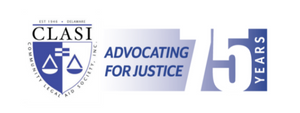Pictured (L-R): Sara Paris, Planner IV at the Domestic Violence Coordinating Council (DVCC); Denise Grybowski, Delaware Coalition Against Domestic Violence (DCADV) WEAVER Task Force Member; Laura Graham, CLASI Deputy Director and DVCC Vice Chair; Angela Seguin, DVCC Executive Director; and Jenna Milecki, Deputy Attorney General and Unit Head of the DV Unit at the Delaware Department of Justice, at Legislative Hall for Crime Victims’ Rights Week Advocacy Day on April 24, 2024.
Community Legal Aid Society, Inc. (CLASI) was proud to participate in Crime Victims’ Rights Week Advocacy Day at Legislative Hall in Dover on April 24, 2024.
CLASI’s Deputy Director Laura Graham joined partners from across the state to advocate on behalf of survivors of crime, including domestic violence and sexual assault, and attend Governor John Carney’s proclamation signing ceremony, which declared the week of April 21 as Crime Victims’ Rights Week in Delaware; a joint resolution from the House and Senate followed the proclamation signing.
Advocacy Day is part of the Delaware Victims’ Rights Task Force’s annual recognition of National Crime Victims’ Rights Week (NCVRW). This week is an annual national event to recognize the needs of crime victims and the theme for NCVRW is set by the U.S. Office for Victims of Crime. The pillars of NCVRW are rights, access, and equity, and this year’s theme is “How would you help? Options, services, and hope for crime survivors.”
Graham discussed CLASI’s work assisting survivors with legislators and urged the importance of establishing Family Justice Centers (FJCs) here in Delaware, an initiative which links directly with this year’s NCVRW theme, as FJCs would increase options and access to services for survivors by creating a “one-stop” location in each county that provides integrated support from a range of agencies.
Graham currently serves as Vice Chair of the Domestic Violence Coordinating Council (DVCC) and Chair of the DVCC Family Justice Center Steering Committee, which is working to bring this innovative model to the First State.
Family Justice Centers offer a centralized place where survivors of domestic violence, sexual assault, elder abuse, child abuse, and human trafficking can receive coordinated services from non-profit and government agencies, which are normally spread across multiple locations. FJCs are family-friendly, victim-centered, and trauma-informed environments where a multidisciplinary team of professionals can work collaboratively to best serve survivors.
In other jurisdictions, the Family Justice Center model has been shown to reduce homicides and increase community support for survivors. By delivering services more efficiently and effectively, FJCs improve outcomes for survivors and their children, and help break the cycle of violence.
Many of the benefits of FJCs connect with the pillars of NCVRW, including that FJCs will:
- provide better access to services by having most of the services a survivor might need under one roof;
- increase access by being on public transportation routes, having translation services available, eventually having one in every county;
- increase access by improving survivor autonomy and sense of safety so that they are more likely to utilize services and less likely to recant;
- ensure equity by removing the barriers that underserved victims face;
- preserve survivors’ rights by increasing efficiency in collaborative services to victims among service providers and increasing accountability of offenders.
To learn more about the Family Justice Center initiative in Delaware, please visit: https://dvcc.delaware.gov/committees/familyjusticecentersteeringcommittee/
Thank you to the Delaware Victims’ Rights Task Force for organizing the day’s events, and to everyone who participated.

